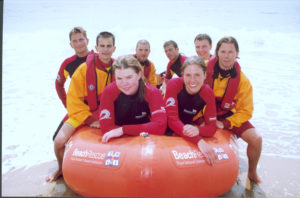
320,000 rescues by RNLI Lifeguards since 2001 launch

2021 marks the 20th anniversary of the RNLI’s lifeguard service to coastal communities and their visitors around the UK and Ireland.
Since its launch in 2001, RNLI lifeguards have saved 1,681 lives, aided 320,087 people through water rescue, returning lost children and delivering first aid and casualty care. They have responded to 251,436 incidents and carried out 32 million preventative actions.
Following a review of figures in 2001 which revealed 200 lives were lost on UK beaches, the lifesaving charity decided to take action. Lifesaving clubs were patrolling many beaches but not on the scale required. Working with lifesaving clubs and beach owners, the RNLI piloted lifeguarded beaches in south-west England to establish a co-ordinated rescue service, resulting in 20 lives being saved in the first year.
This trial led to an official service being formed and advancement in the equipment and training available to lifeguards. Safety literature information and warning signs were also developed for beaches so visitors knew what dangers they may encounter and how to keep themselves safe. Year on year the RNLI’s lifeguard service has grown and there are now over 240 beaches across the UK and Ireland being patrolled.
“Thanks to RNLI lifeguards our beaches are safer places, so we can enjoy our time at the coast and return home safely at the end of the day,” says Robbie Warrington, RNLI head of lifeguard services. “Around 95% of a lifeguard’s work is prevention. They keep beachgoers safe by educating them about water safety and spotting the dangers before accidents happen.
“RNLI lifeguards past and present have kept millions of beach visitors safe over the past 20 years and will continue to do so for years to come. If you are planning a visit to the coast this summer, please remember to visit a lifeguarded beach.”
Lewis Timson, a Lifeguard Supervisor in Newquay, was one of the first RNLI lifeguards to be on beaches in 2001 when he was 18-years-old. Before the RNLI, Timson was part of the local surf school which would operate lifeguarding alongside teaching surf lessons.
“The RNLI already had a strong history of providing a front-line emergency lifesaving service and were able to bring the knowledge and expertise over from the lifeboat service to the lifeguards,” comments Timson. “The equipment and the training from the RNLI really set the gold-standard. As soon as I was working for the RNLI I knew that it was what I wanted to do.”
Timson has since worked overseas as well as on Cornish beaches and when asked whether lifeguarding had changed over the past 20 years, he says: “The fundamentals are the same, we still need to be well trained, capable, skilled lifeguards on our beaches. But there has definitely been a shift with how we keep people safe. This has developed alongside the amount of people we now get visiting our beaches and going in the water. Lifeguarding now is such a proactive service. Being proactive is the standard and the new ‘normal’.”
